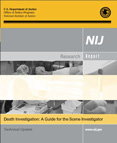|
View in browser: https://www.crime-scene-investigator.net/newsletter/0620.html
|
||
|
JUNE 2020 | ||
| ||
|
This Month's Featured Resource on the Crime Scene Investigator Network Website
|
||

This revised and updated edition is the result of a collaborative effort to present the most up-to-date information about the issues confronting death investigators today. The death investigator is the eyes and ears of the forensic pathologist at the scene. It is hoped that these guidelines, reflecting the best practices of the forensic community, will serve as a national standard. |
New CSI and Forensic Job Announcements
|
|
|
The most comprehensive listing of Crime Scene Investigation and Forensic To be notified of job openings as they are posted, follow us on Twitter: Job Posting Alerts |
||
|
Evidence Technician
Skagit County Sheriff's Office, Mount Vernon, Washington, USA Final Filing Date: June 23, 2020 To perform a variety of duties related to the storage and handling of evidence and property for the Skagit County Sheriff's Office. Responds to field investigations to assist with crime scene processing to include taking photos, sketches, evidence location, evidence processing/collection/packaging, tool mark recovery, castings, latent fingerprints, field testing, providing updates to investigators and scene supervisors, and producing detailed scene reports. <View complete job listing> |
||
|
Forensic Technician
Spokane County Sheriff, Spokane, Washington, USA Final Filing Date: August 7, 2020 The Forensic Technician is an entry-level technical, criminal identification position in the Spokane County Sheriff's Office responsible for latent print processing and crime scene investigation. <View complete job listing> |
||
|
Evidence Technician
McLennan County Sheriff, Waco, Texas, USA Final Filing Date: Open until filled Responds to crime scenes, evaluates the scene and conducts searches for evidence utilizing disciplines related to crime scene investigation to include measures and/or photographs crime scenes, evidence, processing, etc. The Evidence Technician performs a variety of tasks associated with the receiving, tracking, handling, processing, storage, safekeeping and proper disposal of all evidence and property. <View complete job listing> |
||
|
Forensic Scientist, Latent Prints
Arapahoe County Sheriff's Office, Littleton, Colorado, USA Final Filing Date: June 20, 2020 By position, responds to crime scenes on-call to discover, preserve, collect, digitally document and identify physical evidence. Conducts independent physical and chemical processing for the presence of latent prints on evidence, including documentation and digital image capture. Conducts analysis, comparison, evaluation and verification of latent print evidence. <View complete job listing> |
||
 |
||
|
Forensic Scientist III, Digital Evidence
North Carolina Department of Justice, Raleigh, North Carolina, USA Final Filing Date: May 21, 2020 As a Forensic Scientist III, the primary responsibility of this task is to conduct detailed laboratory examinations and analyses of computer evidence involved in criminal cases at the request of all local, State, Federal and Military law enforcement agencies. <View complete job listing> |
||
|
Forensic Analyst - Toxicology (Entry- Level)
Houston Forensic Science Center, Houston, Texas, USA Final Filing Date: Open until filled The Toxicology Analyst may independently perform routine chemical analyses of biological specimens in human performance toxicology cases, prepare reports on findings for use in the criminal justice system, and provide court testimony on analytical results. <View complete job listing> |
||
|
Forensic Scientist I-III, Trace Evidence
Texas Department Of Public Safety, Jersey Village, Texas, USA Final Filing Date: Ongoing Work involves conducting laboratory tests, conducting analyses, and identifying all types of physical evidence from crime scenes with emphasis and specific recognized expertise in an option or specialty area identified above. Work involves interpreting analytical and instrumental results; establishing and maintaining records; preparing technical reports; and testifying as an expert witness in court. <View complete job listing> |
||
|
Property and Evidence Technician
Marin County Sheriff's Office, San Rafael, California, USA Final Filing Date: June 29 2020 The Property & Evidence Technician provides support to law enforcement staff by receiving, logging, storing and managing the integrity of property and evidence, body-worn camera evidence videos, digital media evidence and other items of property and evidence held by the Sheriff. This position supervises the of chain of custody, discovery, evidence transportation, and management of evidentiary digital media. <View complete job listing> |
||
|
Search for more job listings in Crime Scene Investigations and Forensics To be notified of job openings as they are posted, follow us on Twitter: Job Posting Alerts |
||
|
Other Resources on the Crime Scene Investigator Network Website
|
||
|
Not Subscribed to this Newsletter?
|
||
|
If you are not subscribed to this newsletter, you may subscribe with this link: SUBSCRIBE via email |
||
|
To Unsubscribe
|
||
|
To unsubscribe from future e-mail alerts, please click here: UNSUBSCRIBE Copyright ©2020 Crime Scene Resources, Inc. Crime Scene Investigator Network |

